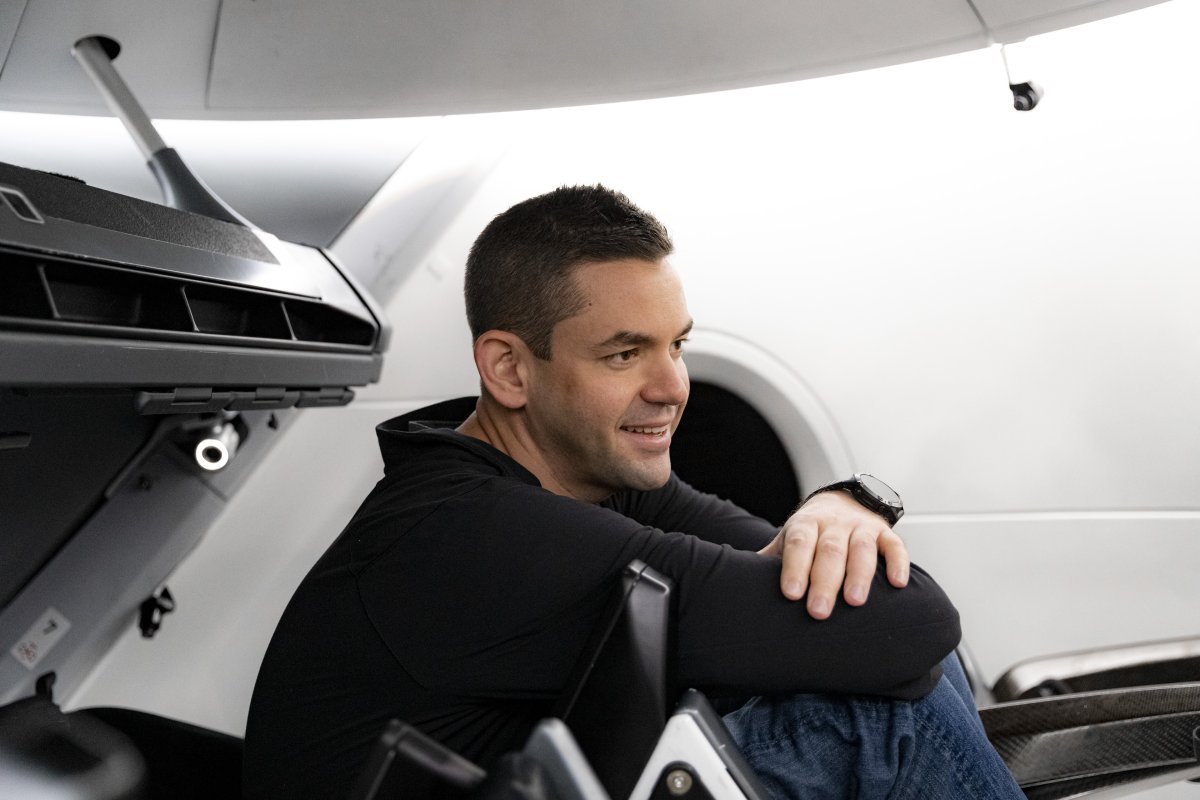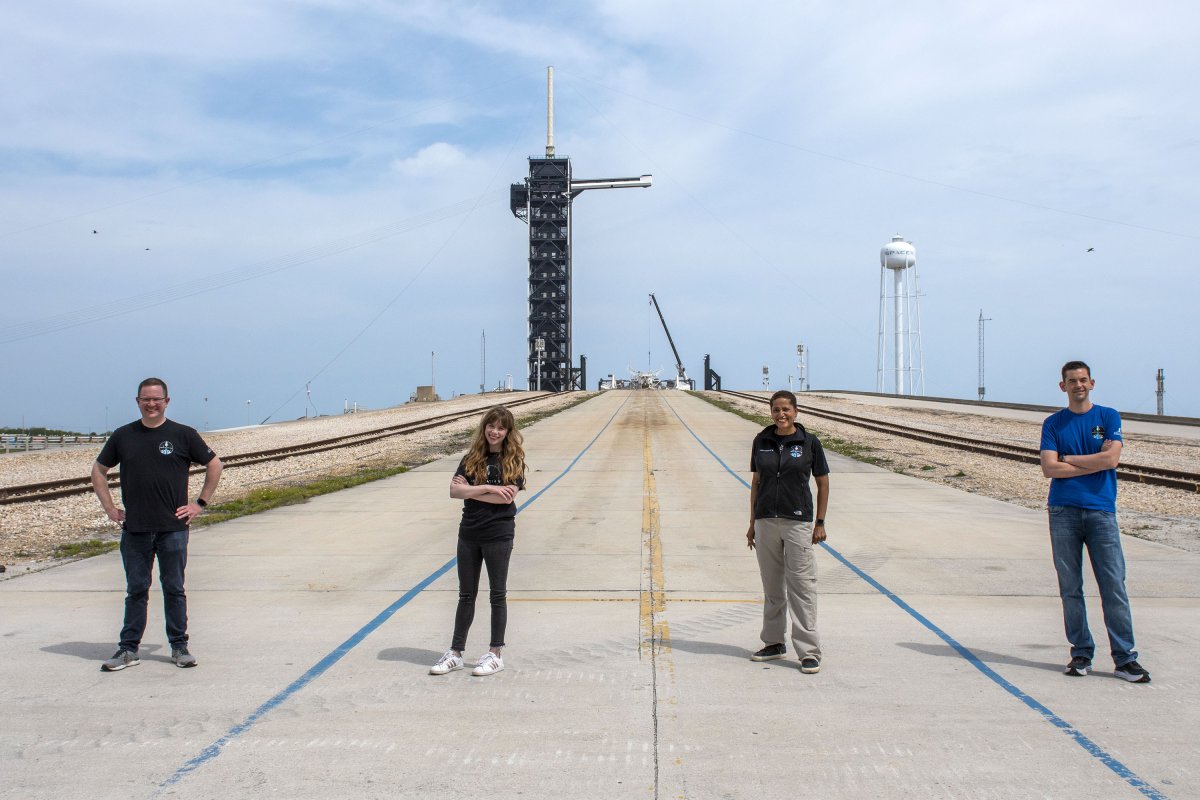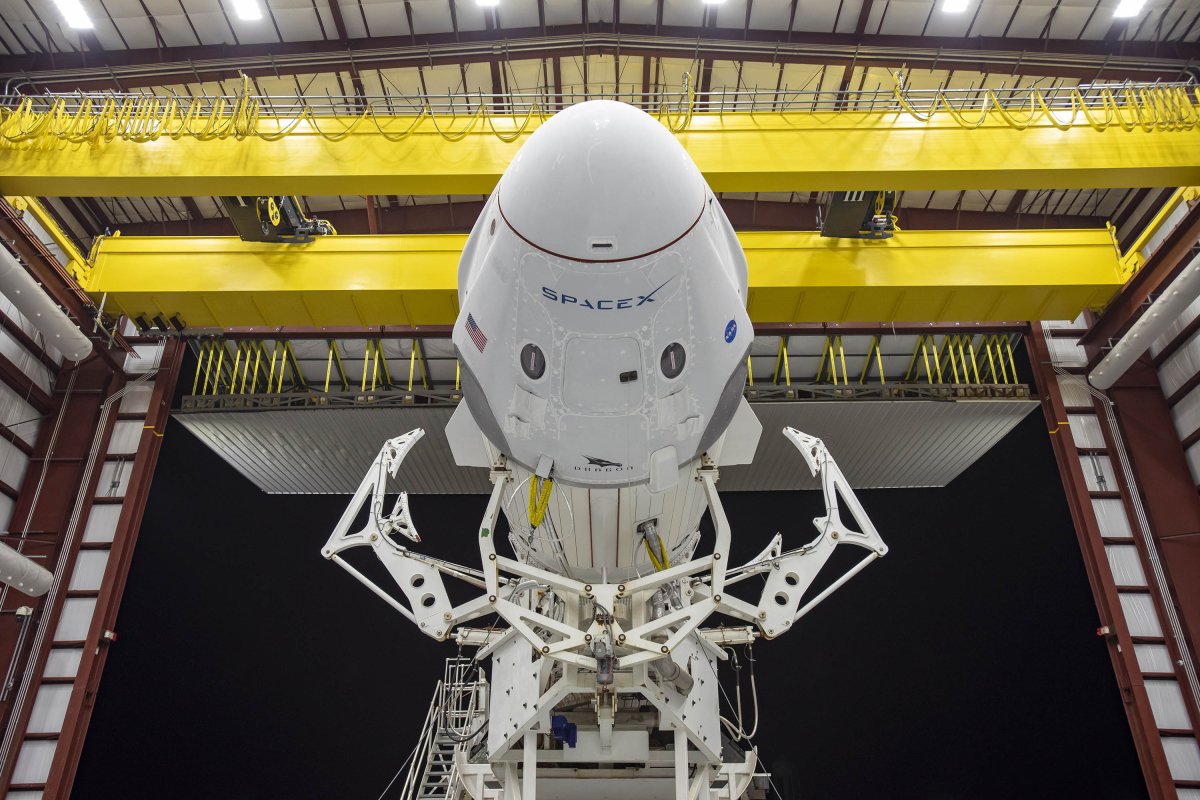Later this year, SpaceX is due to cross a milestone as it launches the first all-civilian spacecraft crew into orbit around the Earth.
The mission is called Inspiration4, and though some of the four-member team have experience with planes or rocket science, none have been to space before.
Yet they will spend around three days straight with one another, packed inside SpaceX's slightly modified 27-by-13-foot Dragon capsule.
The team consists of Hayley Arceneaux, a bone cancer survivor and physician assistant at the St. Jude Children's Research Hospital; Chris Sembroski, an Air Force veteran and aerospace industry professional who once maintained intercontinental ballistic missiles; and Sian Proctor, a pilot, geoscientist and finalist for the 2009 NASA Astronaut Program.
And finally, there is mission commander Jared Isaacman, an experienced pilot and founder of Shift4 Payments and Draken International, a private provider of fighter aircraft to military customers.
Speaking to Newsweek, Isaacman discussed his intense training regime, the mission's aim of raising $200 million for St Jude's Hospital, and the experience of living in what is, essentially, a high-tech space cupboard. Inspiration4 is currently due to launch September 15. Some quotes have been slightly edited for clarity.

Why is this mission significant?
It's the first time that people are going up into orbital space and weren't sent there by a world superpower. You know, it's the highest altitude mission that anyone's gone on in more than 20 years, it's well past the space station.
But it goes further than that. You've got a crew of astronauts that never would have been selected by NASA, whether it's the ultra rigorous health screenings… we have a crew member who's a former pediatric cancer survivor with a prosthetic bone who would have would have been excluded from NASA. But now we're saying that's fine. And what else comes from there? [It's] all about making space more accessible.
The final most significant component to it is, is we're recognizing that in order for us to make progress for tomorrow, we have a responsibility to take care of some of the problems of today. Which is why St. Jude Children's Research Hospital is such a big part of Inspiration4, raising, you know, $200 million to deal with real issues of today. And childhood cancer should sure as hell be at the top of the list.
Has there been a particular aspect of the training where you thought, okay, this is a lot harder than I thought it was going to be?
I think the intensity. I had in my mind that we're going to come out here, and it'll probably be a couple hours of training, and then I'll have some time to do emails, and I'll have some time to do a conference call, and then maybe a few more hours of training… wrong.
You get to SpaceX at 7 a.m. and then we're leaving at the end of the day at 7 p.m. And then you're going back to the hotel and studying, and we've been doing that now for a couple months.
And the flight profile we're going on, it just has a lot of opportunity for things to go wrong. So the amount of things we have to train for is pretty extensive. If you take a look at a NASA crew mission to the space station, they are expediting as fast as possible from the launch pad to the safety of the Space Station. And then when they're leaving, they're coming back and they can wait out bad weather if they need to, they can just stay on the space station a little bit longer.
But for us, once we go up we are we are committed and we have to come down inside of five days. There's no safe haven to go to.

How much are you expecting personally to be controlling Dragon?
Yeah, so it really depends. It's very comparable to almost any jet I've flown. I can be in the cockpit with emails, just monitoring to make sure everything's going correct. So I'd say in that respect, a lot of things can be automated.
The problem is all the automation is done through data links to the ground. So if you lose comms or you start having some sort of a system failure, then everything rolls back to manual.
What about deorbiting?
If everything went exactly as planned, then we will have a deorbit profile that'll be uploaded from the ground, which takes advantage of an army of people in Mission Control, calculating things, which is exactly how the space shuttle did it.
But let's say we're up there and there was something that unexpected happened, then I can manually bring us back.
You're going to be in a modified Dragon. So are you guys going to be having separate living quarters?
No, the four of us are living in the equivalent of a closet. The only real modification is SpaceX is removing the docking system and replacing it with the world's biggest space window. Which is unbelievably cool. You can't see the glass. So you literally feel like you are in space without a spacesuit on.
What's going to happen whenever you need to use the bathroom?
The Dragon has a bathroom on it, and a privacy curtain. It's very close to the ceiling. I mean, it's not very private, but it's a small price to pay to get a chance to go to space.

You're going to be doing some science on board as well. What are the experiments you'll be doing?
Most of it all revolves around the physiological impacts on the human body and cells for radiation exposure, ultimately to support long duration spaceflight. So I mean, if we're going to go to Mars some day, that's a six month transit time. So that takes a toll on your body in a number of ways.
People ask, "what's the radiation exposure for you guys, three days on orbit?" and it's about the equivalent of an abdominal CT scan. Divide six months by one CT scan every three days. And then you've got time at Mars and time to come back, and the reality is, it's hundreds. But then there's also cognitive issues, too, as the fluid shifts in your body.
This whole idea of a commercial space industry and space tourism, how big do you think this is going to be?
It's hard to say. I use the example a lot of Charles Lindbergh's solo flight across the Atlantic Ocean. Twelve years later, you had commercial service for transatlantic flights. So I don't know if it's five years, 10 years, 15 years, but I know if we get our mission, right, the door will remain open for so many more exciting ones to follow.
Was SpaceX quite easy to negotiate with, and did you speak to Elon Musk at any point?
I was just knocking on the door saying, "Hey, I'm interested, whenever this could be a thing, maybe it's a year from now or five years from now." I didn't expect them to say like, we'll be ready in seven months or eight months, and you could be the first. I was like, whoa. So they weren't difficult about it. SpaceX was really easy to work with.
I have spoken to Elon Musk at various points throughout the process. He's super supportive. He's a big brain, a very cerebral guy. I try not to take up much of his time because I feel like I'm pulling him away from solving the world's problems.
What are you looking forward to most about the mission?
Everybody on the crew answers this a little bit differently. But to me, it's really just the execution. I just want to get it right. Don't get me wrong, I'll be looking out the window and I'll be floating and, and eating peanut M&Ms that get chucked around.
But I care about the mission, I know what's at stake. If it goes wrong, everyone's gonna say this was such a bad idea, and that this should stay with NASA and Russian cosmonauts.
I want to get it right. I want to know things are going well, so that we can ensure that door stays open for everyone else. So that's what I care most about the mission.
Uncommon Knowledge
Newsweek is committed to challenging conventional wisdom and finding connections in the search for common ground.
Newsweek is committed to challenging conventional wisdom and finding connections in the search for common ground.
About the writer
To read how Newsweek uses AI as a newsroom tool, Click here.








